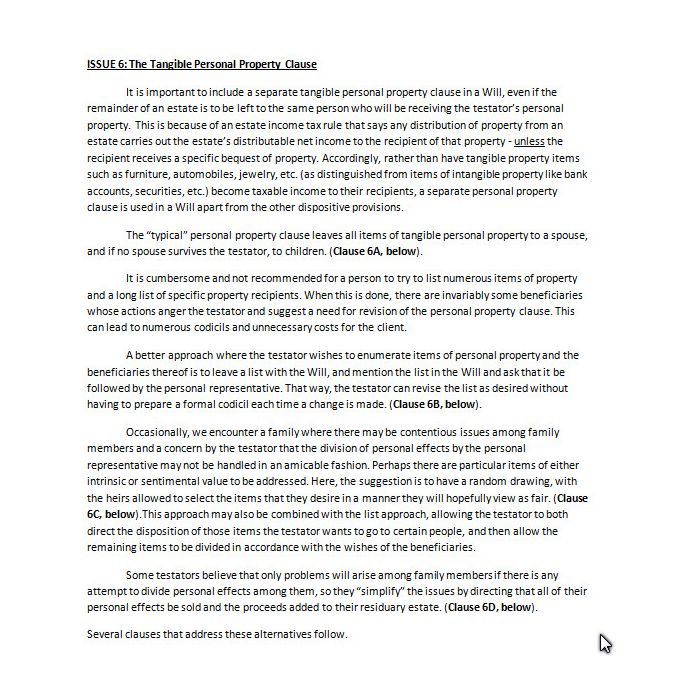Tangible Personal Property Will Clauses - 4 Clauses (4 Pages)
It is important to include a separate tangible personal property clause in a Will, even if the remainder of an estate is to be left to the same person who will be receiving the testator’s personal property. This is because of an estate income tax rule that says any distribution of property from an estate carries out the estate’s distributable net income to the recipient of that property - unless the recipient receives a specific bequest of property. Accordingly, rather than have tangible property items such as furniture, automobiles, jewelry, etc. (as distinguished from items of intangible property like bank accounts, securities, etc.) become taxable income to their recipients, a separate personal property clause is used in a Will apart from the other dispositive provisions.
The Follwing 4 Tangible Personal Property Will Clauses Are Included:
CLAUSE 1: Personal Property to Spouse, Then to Children – No List Provided
CLAUSE 2: List Reference; Balance to Spouse, Then to Children
CLAUSE 3: Selection of Personal Property Assets by Random Drawing
CLAUSE 4: Sell all of the Personal Property
Tangible Personal Property Will Clauses - 4 Clauses
- Personal Property to Spouse, Then to Children – No List Provided
- List Reference; Balance to Spouse, Then to Children
- Selection of Personal Property Assets by Random Drawing
- Sell all of the Personal Property.
It is important to include a separate tangible personal property clause in a Will, even if the remainder of an estate is to be left to the same person who will be receiving the testator’s personal property. This is because of an estate income tax rule that says any distribution of property from an estate carries out the estate’s distributable net income to the recipient of that property - unless the recipient receives a specific bequest of property. Accordingly, rather than have tangible property items such as furniture, automobiles, jewelry, etc. (as distinguished from items of intangible property like bank accounts, securities, etc.) become taxable income to their recipients, a separate personal property clause is used in a Will apart from the other dispositive provisions.
The “typical” personal property clause leaves all items of tangible personal property to a spouse, and if no spouse survives the testator, to children. (Clause 1).
It is cumbersome and not recommended for a person to try to list numerous items of property and a long list of specific property recipients. When this is done, there are invariably some beneficiaries whose actions anger the testator and suggest a need for revision of the personal property clause. This can lead to numerous codicils and unnecessary costs for the client.
A better approach where the testator wishes to enumerate items of personal property and the beneficiaries thereof is to leave a list with the Will, and mention the list in the Will and ask that it be followed by the personal representative. That way, the testator can revise the list as desired without having to prepare a formal codicil each time a change is made. (Clause 2).
Occasionally, we encounter a family where there may be contentious issues among family members and a concern by the testator that the division of personal effects by the personal representative may not be handled in an amicable fashion. Perhaps there are particular items of either intrinsic or sentimental value to be addressed. Here, the suggestion is to have a random drawing, with the heirs allowed to select the items that they desire in a manner they will hopefully view as fair. (Clause 3).This approach may also be combined with the list approach, allowing the testator to both direct the disposition of those items the testator wants to go to certain people, and then allow the remaining items to be divided in accordance with the wishes of the beneficiaries.
Some testators believe that only problems will arise among family members if there is any attempt to divide personal effects among them, so they “simplify” the issues by directing that all of their personal effects be sold and the proceeds added to their residuary estate. (Clause 4).
Author:
Steven G. Siegel is president of The Siegel Group, a Morristown, New Jersey - based national consulting firm specializing in tax consulting, estate planning and advising family business owners and entrepreneurs. Mr. Siegel holds a BS from Georgetown University, a JD from Harvard Law School and an LLM in Taxation from New York University.
He is the author of several books, including: Planning for An Aging Population; Business Entities: Start to Finish; Taxation of Divorce and Separation; Income Taxation of Estates and Trusts, Preparing the Audit-Proof Federal Estate Tax Return, Putting It Together: Planning Estates for $5 million and Less, Family Business Succession Planning, Business Acquisitions: Representing Buyers and Sellers in the Sale of a Business; Dynasty Trusts; Planning with Intentionally-Defective Grantor Trusts; The Federal Gift Tax: A Comprehensive Analysis; Charitable Remainder Trusts, Grantor Trust Planning: QPRTs, GRATs and SCINs, The Estate Planning Course, The Retirement Planning Course, Retirement Distributions: Estate and Tax Planning Strategies; The Estate Administration Course, Tax Strategies for Closely-Held Businesses, and Tort Litigation Settlements: Tax and Financial Issues.
Mr. Siegel has lectured extensively throughout the United States on tax, business and estate planning topics on behalf of numerous organizations, including National Law Foundation, AICPA, CCH, National Tax Institute, National Society of Accountants, and many others. He has served as an adjunct professor of law at Seton Hall and Rutgers University law schools.
The Siegel Group provides consulting services to accountants, attorneys, financial planners and life insurance professionals to assist them with the tax, estate and business planning and compliance issues confronting their clients. Based in Morristown, New Jersey, the Group has provided services throughout the United States. The Siegel Group does not sell any products. It is an entirely fee-based organization.
Contact the Siegel Group through its president, Steven G. Siegel, e-mail: [email protected].


